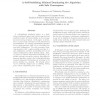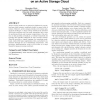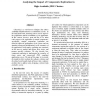104 search results - page 20 / 21 » A Framework for Node-Level Fault Tolerance in Distributed Re... |
IPPS
2006
IEEE
14 years 13 days ago
2006
IEEE
A self-stabilizing distributed system is a faulttolerant distributed system that tolerates any kind and any finite number of transient faults, such as message loss and memory cor...
HPDC
2008
IEEE
14 years 26 days ago
2008
IEEE
Active storage clouds are an attractive platform for executing large data intensive workloads found in many fields of science. However, active storage presents new system managem...
HPDC
2012
IEEE
11 years 8 months ago
2012
IEEE
Hadoop has become a critical component in today’s cloud environment. Ensuring good performance for Hadoop is paramount for the wide-range of applications built on top of it. In ...
ICAS
2005
IEEE
14 years 13 hour ago
2005
IEEE
Clustering is a well known technique that allows scalability and fault tolerance in distributed systems. In the J2EE framework, clustering can be used to improve the performance a...
SIGMOD
2008
ACM
14 years 6 months ago
2008
ACM
As peer-to-peer (P2P) networks become more familiar to the database community, intense interest has built up in using their scalability and resilience properties to scale database...



